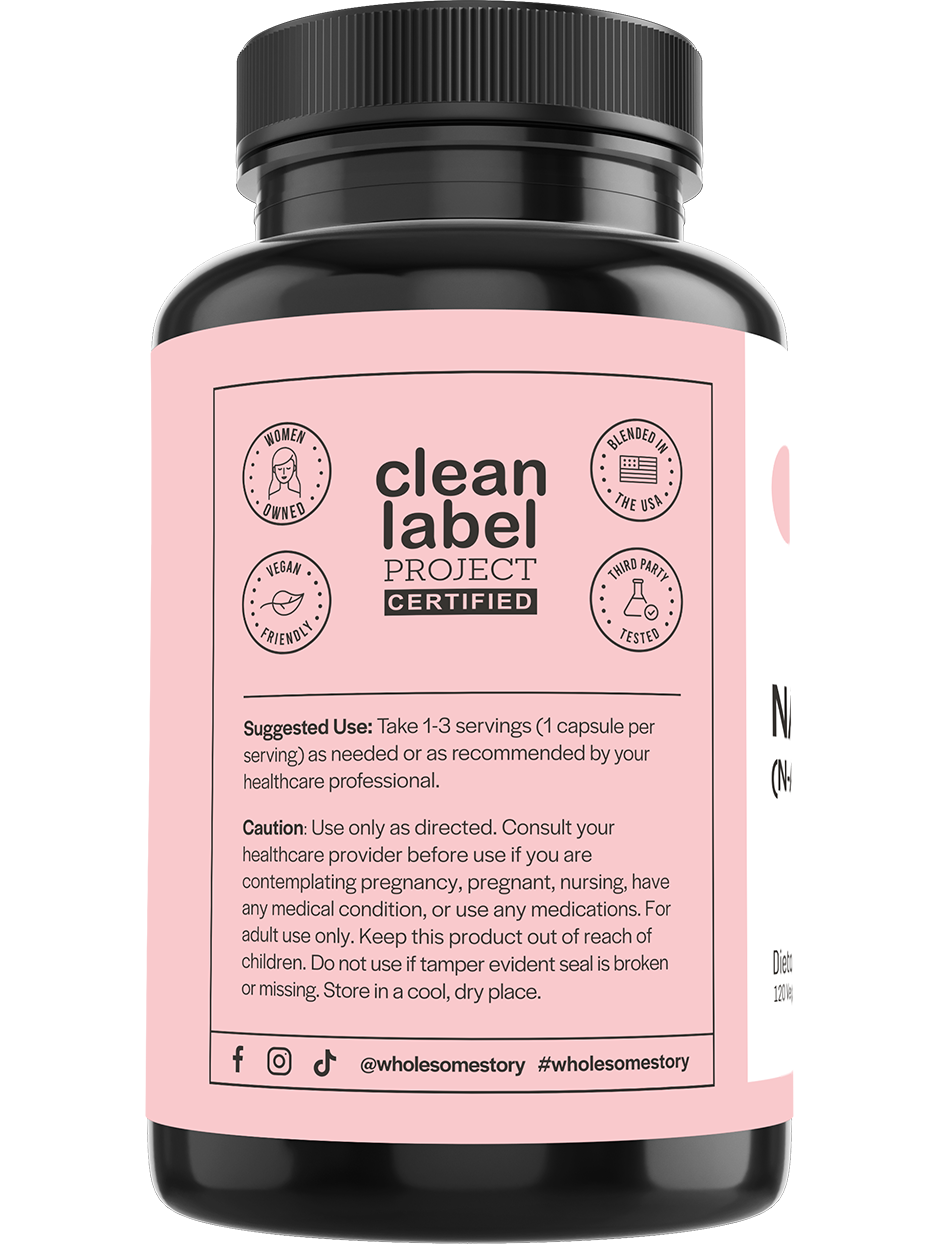



Powerful Antioxidant Support
Powerful Antioxidant Support Benefits*
Supports Your Organs and Tissues*:
NAC is the precursor to glutathione, a powerful antioxidant that helps protect cells against oxidative stress. NAC helps maintain normal cellular health by supporting the body's natural defense against environmental stressors.*
Naturally Supportive*:
NAC is a naturally occurring antioxidant within the human body and supplementing with it at our recommended dose is a gentle way to support normal organ and tissue health during almost any time of life, including pregnancy.*
Supports Reproductive Wellness*:
NAC supplementation helps maintain normal reproductive health due to its antioxidant properties, which may support healthy pregnancy duration as part of normal reproductive processes.*
*These statements have not been evaluated by the Food and Drug Administration. This product is not intended to diagnose, treat, cure, or prevent any disease.
NAC Smell Disclaimer:
Please note that high-quality NAC naturally has a sulfurous smell and that this does not indicate spoilage or contamination.
Take 1-3 servings (1 capsule per serving) as needed or as recommended by your healthcare professional.
Supplement Facts
Serving Size: 1 Capsule
Servings Per Container: 120
Amount Per Serving %DV
N-Acetyl-L-Cysteine (NAC; Free-form): 600mg**
**Daily Value (DV) not established.
Other Ingredients: Methylcellulose (Capsule), Rice Flour.
Active Ingredients:
N-Acetyl-L-Cysteine (NAC; free-form)
Other Ingredients:
Methylcellulose (Capsule), Rice Flour
Use only as directed. Consult your healthcare provider before use if you are contemplating pregnancy, pregnant, nursing, have any medical conditions, or use any medications. For adult use only. Keep this product out of reach of children. Do not use if tamper evident seal is broken or missing. Store in a cool, dry place.
Please use caution when taking this product if you have a history of any bleeding or clotting disorders, or if you are taking any other supplement or medication that may have anticoagulant or antiplatelet effects, as this combination may increase the risk of bleeding.
- https://pubmed.ncbi.nlm.nih.gov/6340205/
- https://pubmed.ncbi.nlm.nih.gov/18851855/#:~:text=The%20discontinuation%20rate%20was%2011.4,in%20patients%20with%20bacterial%20vaginosis
- https://pubmed.ncbi.nlm.nih.gov/18983759/
- https://pubmed.ncbi.nlm.nih.gov/23731375/
- https://link.springer.com/article/10.1007/s40264-020-01026-y?fbclid=IwAR1t5utGgSc8nZTgUiAhLwh3BuJux9oJGszION8xuTSayNqEk3UgegzIt2c#ref-CR11
- https://www.tandfonline.com/doi/full/10.1080/10715762.2018.1468564
- https://onlinelibrary.wiley.com/doi/10.1002/brb3.208
- https://www.mdpi.com/1420-3049/23/12/3305/htm
- https://pubmed.ncbi.nlm.nih.gov/19621836/
- http://clevelandclinic.org/reproductiveresearchcenter/docs/agradoc162A.pdf
- https://www.sciencedirect.com/science/article/abs/pii/S0306987712001405?via%3Dihub
- https://www.ncbi.nlm.nih.gov/pmc/articles/PMC4744393/
- https://www.dovepress.com/update-on-the-pathological-processes-molecular-biology-and-clinical-ut-peer-reviewed-fulltext-article-COPD
- https://www.ncbi.nlm.nih.gov/pmc/articles/PMC4531779/
- https://www.ncbi.nlm.nih.gov/pmc/articles/PMC2967178/
- https://www.ncbi.nlm.nih.gov/pmc/articles/PMC3844587/
- https://www.hindawi.com/journals/bmri/2018/2469486/
- https://www.tandfonline.com/doi/full/10.3109/15412555.2014.898040
- https://www.rbmojournal.com/article/S1472-6483(09)00289-2/fulltext
- https://www.fertstert.org/article/S0015-0282(02)03133-3/fulltext#secd46190485e837
- https://www.ncbi.nlm.nih.gov/pmc/articles/PMC3411859/
Shipping & Returns
We offer a full refund on the purchase price minus shipping of our supplement products any time within 90 days (up to 3 bottles full or empty) for orders shipped in the United States. To process a refund, please email us using our Contact Us page for instructions on returning the bottles.
Customers are responsible for the return shipping cost. Once your return is received and inspected, we will send you an email to notify you that we have received your returned item. A credit will automatically be applied to your credit card or original method of payment, within 7 business days.

Still in doubt?
Try for 90 days first.
-
Why does my NAC smell like rotten eggs?
NAC naturally has a sour, suphury smell that many people describe as "rotten eggs". Not all NAC supplements smell this way, only the good-quality ones do. Our NAC is very high-quality, and therefore rather pungent. -
Is your NAC good for men too?
Yes! NAC can provide antioxidant support for organ and tissue health in both men and women*. -
Is your NAC safe to take while pregnant?
NAC is considered safe for most pregnant women and their babies*. However, since every body and situation is unique, we recommend you speak with your healthcare provider before adding NAC to your routine, especially if pregnant or nursing. -
Is your NAC safe to take while nursing/breastfeeding?
Our NAC is considered safe for most women while nursing/breastfeeding*. However, you should always consult your healthcare provider before introducing any new supplement to make sure it's a good choice for your individual situation, especially when nursing or pregnant. -
Is your NAC safe to take while on birth control?
Yes, NAC is generally considered safe to take alongside hormonal birth control*. As with all supplements, though, we recommend you check with your healthcare provider about it and make sure they approve of the addition before you start taking it. -
Can I take other supplements at the same time as NAC?
NAC is generally considered safe to take with most other supplements.* However, you should always check with your healthcare provider before adding a new supplement to your routine. -
Is there a limit on how long I should use the NAC?
We cannot advise you on how long to take NAC since the reasons you're taking it will likely impact how long you continue. It's best to speak with your doctor to determine what would be best for you, personally. -
Is your NAC free of soy, gluten, dairy, eggs, and other allergens?
Our NAC supplements contain no animal products, gluten, soy, or nuts*. However, our products are made in a facility that also processes common food allergens, so we cannot promise the complete chemical absence of any allergen unless listed on the label.








